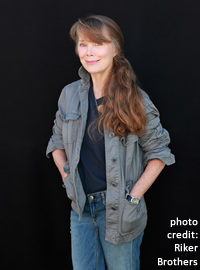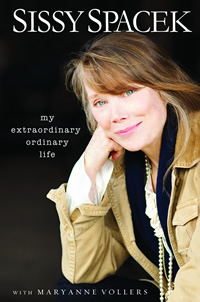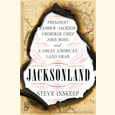The Agricultural Agent’s Daughter
In a new memoir, Sissy Spacek idealizes her small-town, Southern roots and love of simple pleasures
Sissy Spacek may be a Hollywood legend—she’s best known for her Academy Award-winning portrayal of Loretta Lynn in the 1980 film Coal Miner’s Daughter—but the tales in her new memoir are refreshingly devoid of unwanted pregnancies, drug and alcohol addiction, marital abuse, family dysfunction, or devastating divorce. My Extraordinary Ordinary Life—written with journalist and author Maryanne Vollers, who also collaborated with Hillary Rodham Clinton on Living History and with Ashley Judd on All That is Bitter and Sweet—contains no shocking bombshells, no reprisals, not even the faintest hint of relationship retaliation. The memoir is quite simply the account of a charmed and happy life, of family love and loyalty, of cherished children and pets, of gardens watered in pajamas. To Spacek’s great credit, it’s doubtful that Piers Morgan will scramble to book her on the show.
Spacek recounts her relatively idyllic childhood in Quitman, Texas, the small town where she grew up with two older brothers she loved dearly, and her parents: unfailingly optimistic Virginia (or “Gin”) and Edwin, an agricultural agent who was Spacek’s own version of To Kill a Mockingbird’s Atticus Finch. (Which is perhaps one reason that Spacek counts narrating the audio book of Harper Lee’s novel, at the author’s request, among her career highlights.)
The book also covers Spacek’s early professional focus as a singer-songwriter in New York, her vast and varied film career in movies such as Badlands, Carrie, and Coal Miner’s Daughter, the relationships she cultivated along the way, and an assortment of humorous anecdotes collected over the course of a four-decade-long Hollywood career. There was, for example, the telegram Dolly Parton once sent Spacek: “Dear Sissy, I hope you make millions of dollars from Coal Miner’s Daughter so that you can get a boob job and do the Dolly Parton story.”
 But in a meaningful way, stardom takes a backseat in this memoir, which believably casts Spacek as a stiletto-averse country girl who has only ever loved one man, prefers dogs to acolytes, loves using her grandmother’s silver spoons in her morning coffee, and, at sixty-two, still enjoys walking barefoot in the morning dew, just as she did as a girl in East Texas. Of course, before she and her brothers were allowed to shed their shoes for the summer, “Daddy” had to deem the ground warm enough. After he did, though, the bottoms of her feet grew tough as leather for a few months of the year. In childhood, she played with her brothers at the town dump, named the family cat—who had come from the dump—Cattywampus, buried a cigar box of treasures in the backyard, twirled a baton as a high-school majorette, and was voted homecoming queen.
But in a meaningful way, stardom takes a backseat in this memoir, which believably casts Spacek as a stiletto-averse country girl who has only ever loved one man, prefers dogs to acolytes, loves using her grandmother’s silver spoons in her morning coffee, and, at sixty-two, still enjoys walking barefoot in the morning dew, just as she did as a girl in East Texas. Of course, before she and her brothers were allowed to shed their shoes for the summer, “Daddy” had to deem the ground warm enough. After he did, though, the bottoms of her feet grew tough as leather for a few months of the year. In childhood, she played with her brothers at the town dump, named the family cat—who had come from the dump—Cattywampus, buried a cigar box of treasures in the backyard, twirled a baton as a high-school majorette, and was voted homecoming queen.
“For seventeen years, Quitman was the center of my universe,” Spacek writes. “I always appreciated the accident of my birth into such a wonderful world. As a child, I would lie in bed at night and think, I’m so lucky to be born in Texas, to live in this house with these parents, and these brothers, and….. All the things that are most important to me, I had before I left that little town. My values were formed in a community where material possessions didn’t count for much, relationships were everything, and where waiting for something you wanted could actually be better than having it.”
But Spacek’s childhood was not without trauma. Her brother Robbie, a high-school track star sixteen months her senior and with whom she was very close, died of leukemia as a teenager. For years afterward, she kept the Austin Healey his father had bought him during his treatment.
Though Spacek had planned to attend college, the artist’s life in New York called to her, and so she set off there to pursue a music career—she was an accomplished guitarist and a talented songwriter—while still a teenager. Fortuitous meetings with the right people led Spacek to switch her focus to acting and she began to audition. It was on the Colorado set of Badlands, a 1973 critical if not box-office success, that she met the man who would become—and who remains—her husband, the art director Jack Fisk.
 “We were a perfect match,” she writes. “I always fell for the tall, dark, handsome guys. And Jack had always dated strawberry blonds, starting with his first grade girlfriend Maude, who I’m told looked a lot like me. When we showed each other the childhood photos we carried with us, both of us proudly holding up fish we’d caught, it looked like we could have grown up in the same neighborhood. We would have been friends.” They married at the Cottage Chapel in Santa Monica on the day before the blood tests they’d taken to get their marriage license were about to expire. She wore jeans and carried a new penny, and insisted the minister excise the words “and obey” from the vows. Their witness was Jack’s dog Five, whose ink-covered paw print adorns their wedding certificate.
“We were a perfect match,” she writes. “I always fell for the tall, dark, handsome guys. And Jack had always dated strawberry blonds, starting with his first grade girlfriend Maude, who I’m told looked a lot like me. When we showed each other the childhood photos we carried with us, both of us proudly holding up fish we’d caught, it looked like we could have grown up in the same neighborhood. We would have been friends.” They married at the Cottage Chapel in Santa Monica on the day before the blood tests they’d taken to get their marriage license were about to expire. She wore jeans and carried a new penny, and insisted the minister excise the words “and obey” from the vows. Their witness was Jack’s dog Five, whose ink-covered paw print adorns their wedding certificate.
The role for which Spacek is best known was one she almost passed up. Before Spacek had ever been approached for the role, Loretta Lynn announced publicly and repeatedly that the “little ol’ strawberry blonde with a freckled face, Little Sissy Spacek” was going to play her character. Only when Spacek traveled to Shreveport to give Lynn the what-for was the actress convinced she had to do the part.
“When she told me she had twenty-seven goats back at her farm outside Nashville, I was a goner,” Spacek writes.
After the film’s runaway success and still early in their careers, Spacek and Fisk sought a simpler, more private life outside of Hollywood. They bought a Virginia farm that reminded Spacek of where she grew up. During the Civil War, Robert E. Lee’s soldiers camped in what is now their front field. The farm is where they raised their two daughters—Schuyler, a singer-songwriter, and Madison, an artist and filmmaker—and where they continue to live to this day. They have cultivated friendships with locals with names like Hugh, Winkie, Posy, and Blue. Spacek considered it a compliment when a carpenter in town told her friend Barclay, “Sissy Spacek? Why she’s just as ordinary as an old bar of homemade soap.”
“Our farm is in the shadow of the Southwest Mountains,” Spacek writes, “one of the oldest mountain ranges in America, where we ride along the same trails that Thomas Jefferson had traveled, and rest in the shade of the same majestic trees. One of them is a massive oak so old I can only imagine all it has seen. When I run my hand along its rough bark, I think of how deep its roots have grown to keep it standing through all the windstorms and heavy snows it’s endured over the years. I feel rooted like that tree in this soil.”
On May 13, as part of the Salon@615 series, Sissy Spacek will discuss My Extraordinary Ordinary Life at the Nashville Public Library at 3 p.m. Click here for event details.


